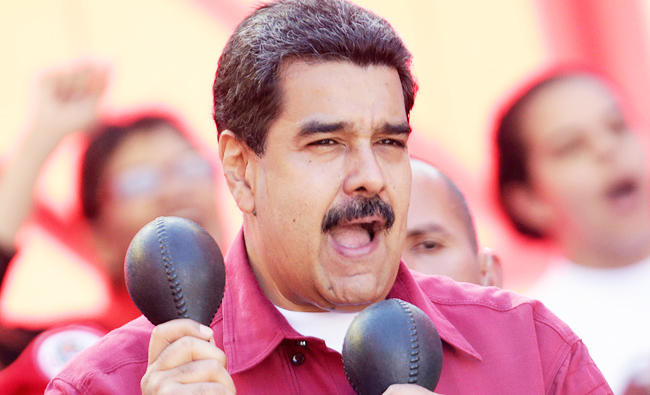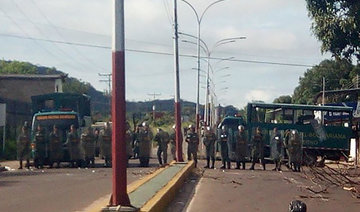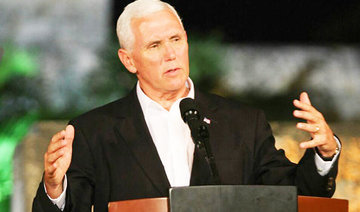CARACAS/LIMA: A group of 12 regional nations plus the US rejected Venezuela’s new government-allied legislative superbody, saying they would continue to regard the opposition-controlled congress as the country’s only legitimate law maker.
The move came after an announcement on Friday that the newly-created Constituent Assembly, elected in late July to re-write the crisis-hit country’s Constitution, would supersede congress and pass laws on its own.
The Lima Group, including Peru, Argentina, Brazil, Canada, Colombia and seven other regional governments, late on Friday joined the US in criticizing the assembly for “usurping” the powers of Venezuela’s tradition congress.
The congress has been controlled by the opposition since 2016, but has been neutered by President Nicolas Maduro’s loyalist Supreme Court, which has tossed out almost every law it has passed.
“We reiterate our rejection of the constituent assembly and its actions,” the 12-member Lima Group said in a statement published by Peru’s Foreign Ministry.
“We ratify our full support for the Venezuelan congress.” it added.
Maduro has slapped the opposition with several measures blaming it for the unrest that killed more than 125 people in recent months as security forces met rock-throwing protesters with rubber bullets and water cannon. The UN says government troops used excessive force in many cases.
One of the measures is the assembly’s new truth commission that will investigate opposition candidates running in October gubernatorial elections, to see if they were involved in the deadly protests. Considering that many opposition figures supported the demonstrations, the commission could hobble their efforts at winning governorships in the upcoming vote.
Anti-government marches have stalled since the assembly was inaugurated on Aug. 5. The opposition was stunned by a threat of US military action in Venezuela issued by President Donald Trump on Aug. 11.
The threat played into Maduro’s hands by supporting his oft-repeated assertion that the US “empire” wants to invade Venezuela to steal its oil. The idea had been easily dismissed as absurd by opposition and US officials before Trump’s surprise statement that “a military option” was on the table for dealing with Venezuela’s political crisis.
Over the days ahead the assembly says it will pass a law against “expressions of hate and intolerance,” which rights groups say is so vaguely worded it could allow for the prosecution of almost anyone who voices dissent.
Regional nations, US flay Maduro for superseding congress
Regional nations, US flay Maduro for superseding congress

Low snow on the Himalayas threatens water security — study

- While snow levels fluctuate each year, scientists say climate change is driving erratic rainfall and shifting weather patterns
- Snow and ice crucial water source for around 240 million people in mountainous regions, 1.65 billion people in the river valleys below
KATMANDU: Millions of people dependent on Himalayan snowmelt for water face a “very serious” risk of shortages this year after one of the lowest rates of snowfall, scientists warned Monday.
Snowmelt is the source of about a quarter of the total water flow of 12 major river basins that originate high in the region, the report said.
“This is a wake-up call for researchers, policymakers, and downstream communities,” said report author Sher Muhammad, from the Nepal-based International Center for Integrated Mountain Development (ICIMOD).
“Lower accumulation of snow and fluctuating levels of snow pose a very serious increased risk of water shortages, particularly this year.”
Snow and ice on the Himalayas are a crucial water source for around 240 million people in the mountainous regions, as well as for another 1.65 billion people in the river valleys below, according to ICIMOD.
While snow levels fluctuate each year, scientists say climate change is driving erratic rainfall and shifting weather patterns.
The report measured “snow persistence” — the time snow remains on the ground — with levels dropping almost a fifth below normal this year across the wider Hindu Kush and Himalaya region.
“This year’s snow persistence (18.5 percent below normal) is the second-lowest in the past 22 years, narrowly trailing the record low of 19 percent set in 2018,” Muhammad told AFP.
As well as Nepal, the inter-governmental ICIMOD organization includes member countries Afghanistan, Bangladesh, Bhutan, China, India, Myanmar and Pakistan.
The report warned that ICIMOD “observations and projections indicate significant changes in the timing and intensity of stream flows,” with snow a key part.
“Snow plays a particularly important role in ensuring seasonal water availability,” it added.
The organization has been monitoring snow in the region for over two decades, noting that 2024 marked a “significant anomaly.”
The Ganges river basin, which flows through India, had the “lowest snow persistence” that ICIMOD has recorded, 17 percent below average, worse than the 15 percent in 2018.
The Helmand river basin in Afghanistan recorded its second-lowest snow persistence levels, 32 percent below normal.
The Indus river basin was down 23 percent below normal levels, while the Brahmaputra river basin, which ends in Bangladesh, had snow persistence “notably below normal” at 15 percent.
Miriam Jackson, senior cryosphere specialist at ICIMOD, urged authorities to “take proactive measures to address possible drought situations.”
Indian suspect in plot to kill Sikh separatist extradited to US

- Man accused over murder-for-hire plot extradited from Czech Republic
- Alleged plot targeted Sikh separatist resident in US, India denies involvement
WASHINGTON/PRAGUE: An Indian man suspected by the US of involvement in an unsuccessful plot to kill a Sikh separatist on American soil has been extradited to the United States from the Czech Republic, the Czech justice minister said on Monday.
Nikhil Gupta has been accused by US federal prosecutors of plotting with an Indian government official to kill Gurpatwant Singh Pannun, a US. resident who advocated for a sovereign Sikh state in northern India.
Gupta traveled to Prague from India last June and was arrested by Czech authorities. Last month, a Czech court rejected his petition to avoid being sent to the US, clearing the way for the Czech justice minister to extradite him.
“On the basis of my decision on (June 3), the Indian citizen Nikhil Gupta, who is suspected of conspiracy to commit murder-for-hire with intent to cause death, was extradited to the US on Friday (June 14) for criminal prosecution,” Czech Justice Minister Pavel Blazek said on social media platform X.
The comments confirmed an earlier Reuters story reporting on the extradition that cited the federal Bureau of Prisons website and a source familiar with the matter.
An inmate search by name on the Bureau of Prisons website showed on Sunday that Gupta, 52, was being held at the Metropolitan Detention Center, Brooklyn, a federal administrative detention facility.
A US Justice Department spokesperson declined to comment. Gupta’s US-based lawyer, attorney Jeffrey Chabrowe, had no immediate comment.
Over a dozen people were killed and tens injured after a freight train smashed into the back of a stationary passenger train in India’s West Bengal state on Monday,
DIPLOMATIC RELATIONS TESTED
The discovery of alleged assassination plots against Sikh separatists in the US and Canada has tested relations with India, seen by Western nations as a counter to China’s rising global influence. India’s government denies involvement in such plots.
Canada said in September its intelligence agencies were pursuing allegations linking India’s government to the murder of Sikh separatist leader Hardeep Singh Nijjar in June 2023 in Canada.
In November, US authorities said an Indian government official had directed the plot in the attempted murder of Pannun, who is a US and Canadian citizen. Gupta is accused of involvement in that plot.
Pannun told Reuters on Sunday that while the extradition was a welcome step, “Nikhil Gupta is just a foot soldier.” He alleged that those who hired Gupta were senior members of the Indian government who act on the direction of Prime Minister Narendra Modi.
India’s government has dissociated itself from the plot against Pannun, saying it was against government policy. It has said it would formally investigate security concerns raised by Washington.
New Delhi has long complained about Sikh separatist groups outside India, viewing them as security threats. The groups have kept alive the movement for Khalistan, or the demand for an independent Sikh state to be carved out of India.
Last month, Washington said it was satisfied so far with India’s moves to ensure accountability in the alleged plots, but added that many steps still needed to be taken.
Train crash in eastern India kills 15, injures dozens

- Accident blamed on freight driver disregarding signal
- Incident reflects government negligence, opposition leader says
KOLKATA: A freight train smashed into the rear of a stationary passenger train in India’s West Bengal state on Monday, killing at least 15 people and injuring dozens, police said, in an accident that railway authorities blamed on driver error.
Media showed images of the pile-up, with containers from the goods train strewn nearby, and one carriage left nearly vertical after the accident, which comes just over a year after a signalling error caused one of India’s worst rail crashes.
Fifteen bodies were pulled from the mangled carriages, Abhishek Roy, a senior police official in the eastern state’s district of Darjeeling, the site of the accident, told Reuters.
Fifty-four people were injured and rescue teams from the police and national disaster response force were working to clear debris from the derailed carriages, Roy added.
The goods train hit the Kanchanjunga Express traveling to Kolkata, the capital of West Bengal, from the northeastern state of Tripura, driving three carriages of the passenger train off the rails.
It was not immediately clear how many passengers were on board at the time.
Rescuers used iron rods and ropes to work free one carriage of the passenger train that had been swept upwards to lodge on the roof of the freight train by the impact of the collision.
The dead included the driver of the freight train and a guard on the passenger train, Jaya Varma Sinha, the head of the railway board that runs the countrywide network, told reporters.
The accident happened after the driver of the freight train disregarded a signal, Sinha added.
Rescue work has been completed, Sinha said, and authorities are working to restore traffic, with the damage less extensive than initially feared.
“The guard’s compartment in the passenger train was badly damaged,” she added. “There were two parcel vans attached ahead of it which reduced the extent of damage to passengers.”
Nearby residents heard a loud crash and saw the pile-up upon going to investigate, several told the ANI news agency, in which Reuters has a minority stake.
Prime Minister Narendra Modi offered condolences on the loss of life and said Railway Minister Ashwini Vaishnaw was on his way to the site.
About 288 people died a year ago in the neighboring state of Odisha, in India’s worst rail crash in more than two decades, caused by a signal failure.\
Opposition parties criticized Modi’s government for its record on rail safety.
“The increase in railway accidents in the last 10 years is a direct result of the mismanagement and negligence of the Modi government, which results in loss of lives and property of passengers on a daily basis,” Modi’s main opponent and Congress party leader Rahul Gandhi said in a post on X.
Nigel Farage promises tighter UK borders and tax cuts in election ‘contract’

- Immigration control receives top billing in policy plan
- Reform seeks to tempt voters away from Sunak’s Conservatives
MERTHYR TYDFIL, Wales: Nigel Farage, whose entry into the election has damaged Prime Minister Rishi Sunak’s faint hopes of victory, set out his policy plans on Monday, describing them as the first step to becoming the dominant party on the right of British politics.
On Monday he said the earlier-than-expected election had come too soon for his Reform UK party but called on supporters of Sunak’s Conservatives to “join the revolt” and pitched Reform as the only ones who could hold to account Labour, whose leader Keir Starmer is forecast to become the next prime minister.
Farage is one of Britain’s most recognizable and divisive politicians and has pressured successive governments into more aggressive stances on cutting immigration. He played a pivotal role in the 2016 vote to leave the European Union.
But his career has been spent campaigning from the sidelines of British politics, having stood unsuccessfully for a seat in parliament seven times and led parties which, despite attracting millions of votes, have failed to weaken the grip of Britain’s two main parties — the Conservatives and Labour.
This time Farage is standing in Clacton-on-Sea, southeast England, where polling shows he could win a place in parliament, but under Britain’s electoral system Reform is only expected to win, at most, a handful of seats across the country.
“We are not pretending that we are going to win this general election,” Farage said at the launch of a 24-page policy document, which he described as a “contract” with voters for the next five years.
But he added: “Our aim and our ambition is to establish a bridgehead in parliament and to become a real opposition to a Labour government.”
Reform chose Merthyr Tydfil for its launch to highlight what it says is Labour misrule in Wales.
Farage’s unexpected entry into the election race — having initially said he would not run and wanted to concentrate on campaigning for Donald Trump in the United States — has split support among Britain’s right-of-center voters.
The Labour Party is around 20 percentage points ahead in opinion polls and forecast to win a large majority. Reform overtook the Conservatives in one poll last week, and Farage has set a target of winning six million votes at the July 4 election.
Other polls put them far behind the governing party.
“JOIN THE REVOLT“
The Reform campaign has so far focused on Farage and his populist appeal.
The 60-year-old received an expensive private education and worked as a commodities trader but has successfully styled himself as a man of the people taking on an out-of-touch political establishment.
Reform’s policies are designed to appeal to the right of center voters who would typically back Sunak’s Conservatives, and they demand change across all the main policy areas.
Immigration, the issue on which Farage has for more than a decade struck a chord with voters, received top billing.
Reform promised to immediately freeze “non-essential” immigration, leave the European Convention on Human Rights, and push migrants arriving by small boats back to France before they land on British shores. They also proposed an extra payroll tax on companies who employ foreign workers.
That tax was one of a raft of measures, including shaving 15 billion pounds off the benefits bill, to raise money that would be spent on tax cuts elsewhere, including raising the income tax threshold to 20,000 pounds, slashing fuel duty by 20 pence per liter and getting rid of value added tax on energy bills.
“This is not a protest document, this is not a protest vote,” Farage said. “We’re unashamedly radical, we want change, this isn’t working.”
In India, Muslims and Hindus come together to celebrate Eid Al-Adha

- Hindu-majority India has the world’s largest Muslim-minority population, comprising 200 million people
- Muslim and Hindus traditionally get together during religious festivals to celebrate each other’s holidays
NEW DELHI: Indian Muslims and Hindus celebrated Eid Al-Adha on Monday in the spirit of togetherness, as they shared meals to mark the Feast of Sacrifice.
With over 200 million people professing Islam, Hindu-majority India has the world’s largest Muslim-minority population.
Indian Muslims joined in communal prayers across the country on Monday to start their celebrations of Eid Al-Adha, the second of the two main holidays observed in Islam.
“Eid is the most sacred festival for us. The day starts with morning prayer in the mosque nearby, then we prepare the sacrifice of the goat,” Mohammed Altaf, who lives in Delhi, told Arab News.
Eid Al-Adha commemorates the Prophet Ibrahim’s test of faith when he was commanded by God to sacrifice his son. To reflect his readiness to do so, Muslims around the world slaughter an animal, usually a goat, sheep or cow, and distribute the meat among relatives and the poor.
The holiday is also a time of unity and togetherness for Muslims, with many looking forward to spending the day with friends of different faiths.
“I cherish (welcoming) my Hindu neighbors to my home when they come for a special meal,” Altaf said. “I live in a mixed-housing society, and it has been custom for many years to invite my Hindu friends from the community and outside to partake in the food that we prepare on this special occasion.”
Altaf’s household usually makes several preparations of mutton and at least one sweet dish to serve the guests.
“Not only that, we distribute the raw meat of the sacrificed animals to our relatives and Hindu friends, too. This meat is very sacred, and everyone understands that,” he added.
Indian Muslims have faced increasing discrimination and challenges in the past decade, accompanied by tensions and riots ignited by the majoritarian policies of the Hindu right-wing Bharatiya Janata Party, which rose to power in 2014.
Despite incidents of communal violence, Altaf believes that there are people “who know the value of celebrating the festival together,” in order to keep “the secular spirit of India alive.”
The spirit of togetherness binds India’s diverse communities, said Naser Khan, a resident of Malerkotla city in Punjab.
“Eid Al-Adha means happiness … This is a very pure festival, and we celebrate it with lots of joy,” Khan said.
“In India, Eid is not a one-religion festival. Here, people from all faiths participate in each other’s festivals. On Eid, we invite our Hindu and Sikh friends to dine with us and partake whatever we prepare. It becomes an occasion to assert our sense of community and strengthen our communal bonding.”
Prof. Espita Halder, a Hindu woman from Kolkata, was also joining the festivities with her Muslim friends this Eid.
“We need to create a narrative of harmony. People come close to each other during this festival,” she said.
Meha Dhondiyal, another Hindu woman based in Lucknow, said Eid has always been “a part of our lives.” She learned the tradition of joining Eid feasts from her father and has since carried it forward with her own Muslim friends.
“A nation that celebrates together stays together. Festivals are not only religious but of shared culture. And it makes us happy to celebrate Diwali and Holi festivals with Muslim friends,” Dhondiyal told Arab News.
“It’s also important that in this time of provoked hate due to politics, we keep alive the real alternate narrative of harmony and togetherness. It’s the best way we can think of telling our Muslim friends that they’re not alone. We are together.”














